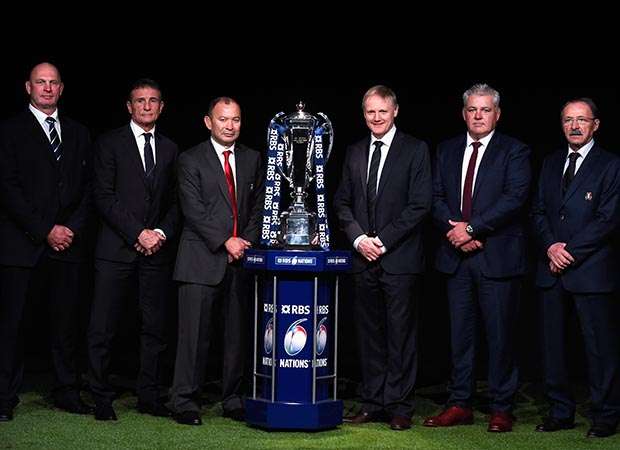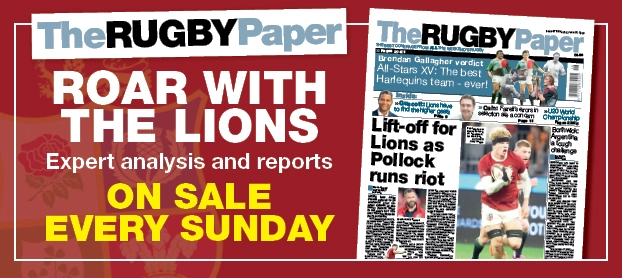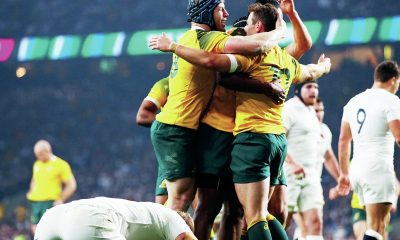
 Three New Zealanders, two Frenchmen and an Aussie. That’s your Six Nations coaching line-up this season, an eclectic and erudite bunch although you will notice that for the first time in the Championship’s history there is not one native coach in charge of a Home Union team. Which seems a bit of rum do the season before a Lions tour to New Zealand.
Three New Zealanders, two Frenchmen and an Aussie. That’s your Six Nations coaching line-up this season, an eclectic and erudite bunch although you will notice that for the first time in the Championship’s history there is not one native coach in charge of a Home Union team. Which seems a bit of rum do the season before a Lions tour to New Zealand.
I don’t normally subscribe to the all-importance of a coach, it’s the players who do the training and front up on the pitch and it is their strength and weaknesses, their valour and coolness under fire that wins matches and titles. But this Championship feels a little different. So many of the teams are at crossroads in their development and at a point where a really great coach and an innovative rugby mind could make a significant difference.
Indeed, European rugby generally is at a crossroads having failed to qualify a single team for the World Cup semi-finals and been trumped in every department by the beasts from the south. There must be a raising of standards, a sharpening of attitudes across the board along with a licence to cut loose and play some rugby – and again the coaches have a big role to play in that respect.
Let’s consider Guy Noves first and the delicious prospect of the guru-like former Toulouse coach sinking on his haunches in contemplation on the touchline of a Test match for the first time.
This man has a serious rugby brain although it has been idling in neutral for the last couple of seasons. To see Toulouse in their pomp in the Heineken Cup was a rugby education. I remember particularly a 51-10 quarter-final victory over Harlequins that took the breath away. The Quins captain that day, Keith Wood, still maintains it was the greatest exhibition of rugby he ever witnessed, either at the sharp end or watching in the stands.
Noves could have been appointed the France coach at any time in the past 20 years and it was perverse in the extreme to see him overlooked when first Marc Lievremont and then Philippe Saint-Andre – coaching lightweights compared with Noves – were appointed ahead of the former France wing.
What happened, of course, is that after a strange collective loss of self-confidence which I date to the 2003 World Cup when an admiring Bernard Laporte took England as the template, France decided they could not win Six Nations and World Cups playing rugby the French way, the old Toulouse way.
Instead, they opted for a curious halfway house which doesn’t suit them at all, the practical rugby Lievremont and Saint-Andre espoused. That approach failed and please don’t quote back at me France’s achievement in reaching the 2011 World Cup final. That entire bizarre campaign was achieved despite the coach and rested on angry players beating a poor England team in the quarter-finals and 14-man Wales in the semi-finals.
Can Noves rekindle the magic? Is it too late for the most successful domestic coach in French rugby history? I don’t believe his age – 62 this Friday – is a problem as some suggest. He cycles 40km a day, is as fit as a fiddle and there will be a dammed-up surge of energy as he gets to grips with the job. No, it’s if he can hit the right buttons and get his squad to rediscover the joy of being French again.
This week in the France Six Nations camp at Marcoussis I would organise at least one session in front of the big screen consisting of a meaty montage of great black and white clips from France in the Fifties, Sixties and Seventies. The present generation have become totally divorced from their rugby heritage.
Eddie Jones, meanwhile, faces a similar task with England. Jones pulled off a minor rugby miracle in getting Japan to play the Japanese way because nobody had defined their style. We think dancing feet, quick hands but what it actually meant was incredibly low, strong scrummaging, ruck and run rugby when in possession, slickly organised backs moves not hari-kari improvisation. For me Jones, half Japanese himself, didn’t rediscover Japanese rugby, he invented it.
So how does he approach England? My guess is that he will look to emulate the England team that caused him the greatest hurt and grief, namely Clive Woodward’s team of 2003.
He will want a strong scrummaging, and nasty, front five, a balanced backrow of all the talents, a general at scrum-half, a goalkicker at fly-half, a playmaker a la Greenwood in midfield and world class try-scoring gas on the wing. Don’t go expecting England to play Japanese-style rugby under Jones, it just isn’t going to happen much as the prospect appeals.
What of Ireland‘s Joe Schmidt? Perhaps the likeable workaholic and micro manager needs to chill a little. There is not the slightest doubt that
Ireland teams in the past needed the attention to detail and structure that Schmidt automatically brings but there must always be room for those vivid Celtic moments of sorcery, imagination and making it up as you go along.
Irish rugby generally has adapted well to professionalism, they have embraced structure and discipline, fitness and systems. What it needs now is to start enjoying the craic a bit more.
It worries me, for example, that Gary Ringrose – the best young centre I’ve seen since a young Brian O’Driscoll burst on the scene in 1999 – is still surplus to requirements. That seems overly cautious. Ringrose shared top billing with Handre Pollard at the 2014 Junior World Cup and Pollard now has 20 Springbok caps to his name.
What of Scotland? It’s difficult to get a handle on Vern Cotter, he’s an elusive coach to pin down and pigeon hole but Clermont played increasing impressive rugby under his tutelage and I enjoyed how Scotland went about their work at the World Cup. He doesn’t smile a lot but Scotland seem to be having fun.
Watching Scotland put Japan to the sword when the rugby world was cheering for the minnows, nip a Samoan comeback in the bud and then tear into the Aussies at Twickenham in the quarter-finals was reassuring to see.
Scotland were breathing fire and brimstone again which is always when they are at their stroppy best and a complete bloody nuisance to play against. Passages of their play were well drilled and thoughtful – a New Zealand coach will always bring that – but Scotland go to another level when they are let off the leash.
Scotland had occasional days like that under Andy Robinson and, indeed, Frank Hadden but they, more than most teams, need to bring that intensity and devil to all their games and achieving that will be Cotter’s biggest challenge. It’s about mentality and mood, something that can’t necessarily be achieved by weeks of hard work on the paddock.
Jacques Brunel is an enigma and I’m not sure he was entirely the right appointment for Italy although actually his record is slightly better than his immediate predecessor Nick Mallet. Too low key, a technician not a communicator. Italy need a brash front-of- house persona to inspire and instil the confidence which is so clearly lacking.
What an intriguing position, however, he now finds himself in approaching a final tournament knowing he is back off to France in March. A free pass if you like, a once in a lifetime opportunity at this elite level to try anything he wants without any dire consequences.
It could all go horribly wrong, of course, but I wonder if Brunel could do Italy a considerable service and uncover a couple of unsuspected stars in the making.
And finally Warren Gatland, the daddy of them all in terms of Six Nations experience, as he embarks on his eighth campaign with Wales – while he also oversaw the best part of four tournaments with Ireland.
Gatland has masterminded two Wales Grand Slam campaigns immediately after World Cups – 2008 and 2012 – with the latter effectively landing him the 2013 Lions job with the appointment being made later that year and there would be a nice symmetry if he completed a hat-trick.
Despite that fine record of achievement, Wales often seem on a knife edge with Gatland. Big injuries have disrupted his best-laid plans in the past but the majority of his star turns are present and correct this time round, players in their pomp with a couple of World Cups behind them.
This, on paper, should be Wales’ year which could make Gatland nervous, he much prefers being labelled as underdog. In truth, though, winning the Six Nations should no longer be the Holy Grail for Gatland, he needs to produce a brand of Welsh rugby that can challenge the Southern Hemisphere teams against whom his record with Wales is lamentable.


Miscellaneous
The Best Rugby Themed Games
Features
OSCAR WILSON



























You must be logged in to post a comment Login